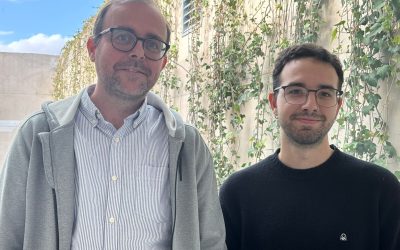Thanks to this scientific work, genetic interactions can be identified with greater precision, resulting in innovative tools for more effective and personalised therapies.
A team of professionals from the Malaga Biomedical Research Institute and Nanomedicine Platform (IBIMA Plataforma BIONAND) and the University of Malaga (UMA) has developed an innovative methodology that promises to transform the way Gene Regulatory Networks (GRNs) are inferred. This advance, recently published in the journal Computers in Biology and Medicineintroduces a new tool called MO-GENECI, which optimises accuracy and reliability in the construction of these complex networks.
Gene Regulatory Networks are fundamental models in biology and medicine, as they describe how genes interact with each other and with other transcription factors, providing detailed insight into cellular processes and their relationship to various diseases. However, inferring these networks from gene expression data has historically been challenging due to the complexity of the data and limitations of existing techniques.
To address this challenge, the team led by Ismael Navas, a researcher from the ‘Knowledge and Data Analysis, Integration and Management (KHAOS)’ group at the UMA, has developed MO-GENECI, a multi-objective evolutionary algorithm that selects the best techniques for network inference, adapting to the particular characteristics of each dataset. This method not only improves accuracy in the identification of genetic interactions, but also mitigates uncertainty in the choice of the appropriate technique for each case.
Adrián Segura highlighted the importance of this advance, ‘since MO-GENECI represents a great step forward because it not only improves the results obtained by individual techniques, but also offers a flexible and adaptable solution that can be applied in different biological contexts’, which opens up, in the words of the pre-doctoral researcher himself, ‘a pathway open to new and more precise studies in the understanding of diseases and cellular processes’.
Likewise, researcher José M. García Nieto, co-author of the paper, emphasises the potential impact of this tool in biomedicine, ‘because MO-GENECI's multi-target approach allows us not only to select the best techniques, but also to optimise several crucial aspects of genetic network inference, as it could have significant implications for the development of more effective and personalised therapies’.
For his part, José F. Aldana, professor at the UMA's Institute of Software Technology and Engineering (ITIS), who coordinates this research group of IBIMA Plataforma BIONAND and the KHAOS group of the UMA, stresses that the development of MO-GENECI contributes to the growing importance of bioinformatics in biomedical research, where advanced computational tools like this one allow deciphering the complex mechanisms of gene regulation with unprecedented precision. This type of research not only contributes to scientific knowledge, but could also accelerate the development of new therapeutic strategies and improve the treatment of diseases.
The source code of MO-GENECI is publicly available, which facilitates its access to the global scientific community and promotes collaboration in future studies that seek to improve and apply this tool in other contexts. MO-GENECI is available in a software package implemented in one of the most popular programming languages and with a fairly intuitive and well-documented command hierarchy within the tool itself. The modularisation of the code allows for easy extension of objectives and incorporation of new inference techniques, even for people with basic programming skills.
Reference:
Segura-Ortiz A, García-Nieto J, Aldana-Montes JF, Navas-Delgado I. Multi-objective context-guided consensus of a massive array of techniques for the inference of Gene Regulatory Networks. Comput Biol Med. 2024 Jul 15;179:108850. doi: 10.1016/j.compbiomed.2024.108850. Epub ahead of print. PMID: 39013340.
.
Raúl J. Andrade Bellido, es Investigador Responsable del grupo consolidado ‘Hepatogastroenterología, Farmacología y Terapéutica Clínica Traslacional’ de IBIMA Plataforma BIONAND, Catedrático y Director del Departamento de Medicina en la Facultad de Medicina de la Universidad de Málaga, Jefe de Servicio Aparato Digestivo del Hospital Universitario Virgen de la Victoria en Málaga. Además, es el Responsable del Grupo Español de Hepatopatias asociadas a medicamentos (Spanish DILI Registry), el Coordinador de la Red Ibero-Americana de Hepatopatías asociadas a medicamentos (SLATINDILI) y también del Registro europeo de Hepatopatías asociadas a Medicamentos (Pro-Euro DILI Registry). Chair de la COST Action CA17112 – Prospective European Drug-Induced Liver Injury Network (PRO-EURO DILI NET) y del EASL DHILI Consortium. Horizonte2020. Framework Programme (European Union).



